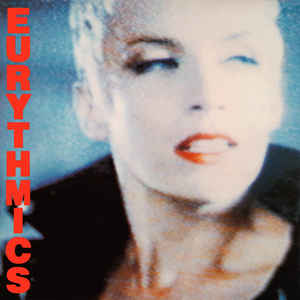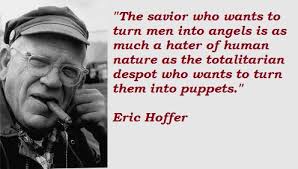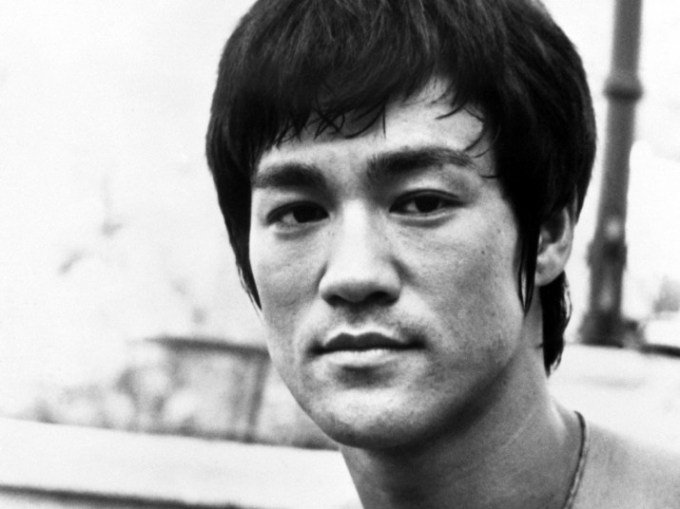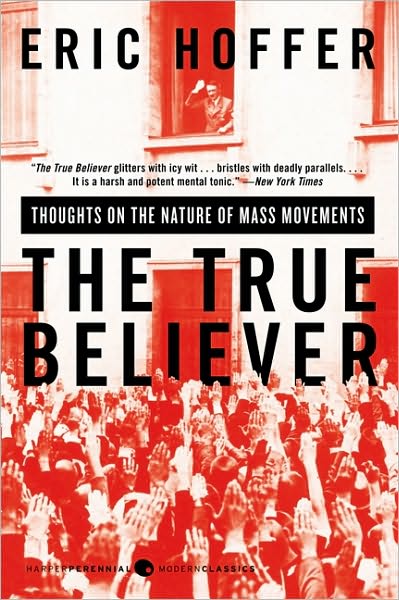|
Word Gems
exploring self-realization, sacred personhood, and full humanity
Eric Hoffer & The True Believer
the psychology of mass-movements,
the rabid search for a substitute-self
return to main-page of the "Jesus" article
Eric Hoffer and his seminal work, The True Believer
On a trip to Florida when I was a young man, I stopped in at Haslam's Book Store, a favorite destination of mine. I picked up a worn copy of "The True Believer" for 50 cents. It would rest on my bookshelf for many years until I finally got around to reading it.
What a jolt for me when I did. Absolutely stunning! Hoffer's writing I rank among the top ten most influential and insightful books I've ever come across. Even as I compile these several quotations for our purpose here, I am astounded, all over again, at the depth of insight of this man into the unenlightened psyche.
It occurs to me now that, as a young man, there may have been subliminal aversion on my part to read Hoffer's book; at the time, I was still very much a "true believer." I might not have been ready for it back then. But, if you are ready, and would rather not wait 40 years, consider these examples of shocking insight by Hoffer...
Eric Hoffer, The True Believer: “The less justified a man is in claiming excellence for his own self, the more ready is he to claim all excellence for his nation, his religion, his race or his holy cause.”
|
Eric Hoffer: "We join mass-movements
to escape individual responsibility"
|
Eric Hoffer, The True Believer: “There is a fundamental difference between the appeal of a mass movement and the appeal of a practical organization. The practical organization offers opportunities for self-advancement, [but]… a mass movement … appeals not to those intent on bolstering and advancing a cherished self, but to those who crave to be rid of an unwanted self.”
|
everybody's looking for something, some of them want to abuse you, some of them want to be abused...

Sweet Dreams Are Made Of This
everybody's looking for something
some of them want to use you
some of them want to get used by you
some of them want to abuse you
some of them want to be abused...
|
Eric Hoffer, The True Believer: “A mass movement attracts and holds a following not because it can satisfy the desire for self-advancement, but because it can satisfy the passion for self-renunciation.”
Eric Hoffer, The True Believer: “People who see their lives as irremediably spoiled cannot find a worth-while purpose in self-advancement… They look on self-interest as on something tainted and evil; something unclean and unlucky. Anything undertaken under the auspices of the self seems to them foredoomed… Their innermost craving is for a new life – a rebirth – or, failing this, a chance to acquire new elements of pride, confidence, hope, a sense of purpose and worth by an identification with a holy cause."

|
more than drinking the koolaid
The long reach of cultism encompasses much more than crackpot churches. The root idea of cult offers the sense of "cut." This core concept of "cut" leads us to images of refinement and refashioning and, by extension, development, control, pattern, order, and system.
Cultism as systemization finds a ready home in religion and philosophy which seek to regulate and redistill the patterning and ordering of ideas. However, in a larger sense, the spirit of cultism extends to every facet of society. We find it scheming and sedulously at work in politics, academia, family, corporations, entertainment, science, artistry – anywhere power might be gained by capturing credulous and fear-based minds.
See the “cultism” page for a full discussion.

|
|
the difference between pride and self-esteem

Bruce Lee: “Pride is a sense of worth derived from something that is not part of us, while self-esteem derives from the potentialities and achievements of self. We are proud when we identify ourselves with an imaginary self, a leader, a holy cause, a collective body of possessions.
“There is fear and intolerance in pride; it is insensitive and uncompromising. The less promise and potency in the self, the more imperative is the need for pride. The core of pride is self-rejection…
“All social disturbances and upheavals have their roots in a crisis of individual self-esteem, and the great endeavors in which the masses most readily unite [are] basically a search for pride.”
|
|
Editor's last word:
Carl Sagan: “You can't convince a believer of anything; for their belief is not based on evidence, it's based on a deep seated need to believe.”
Hoffer's work, in essence, closely tracks that of Tolle. The latter’s “small ego” becomes Hoffer’s “spoiled self.”
There is far too much here on which to comment. I must leave it with you. But I will just say this:
Notice the emphasis on self-disrespect:
Unenlightened persons will join mass-movements – be they political or religious in nature – to escape themselves; to identify with something larger than self, because that “self” is seen to be “not enough” and “spoiled.”
Consider this: We often hear the phrase, to the effect, that it is a good thing to align ourselves with "something larger than self," implying that the "self" is small and suspect. But this is Hoffer's speaking to dysfunction. While humility is not out of fashion, I submit that most of these pronouncements are disguised attempts to rid oneself of a "spoiled self." The fact is, once we've discovered the "true self," which is linked to God, to Universal Intelligence, there is nothing "larger" than that; as such, there will be no healthful psychological aligning of self with something "larger than ourselves" because that's already happened at the core of being.
Confusion here, however, gives rise to a frantic desire for a “substitute self,” one purified and made whole. And that “substitute self,” historically, has manifested as reverence for “savior-gods.”
One final thought. Hoffer speaks of a compulsion toward "re-birth." Elsewhere I have referenced Bishop John Shelby Spong's charge that the Church, desiring to keep it members as malleable children, emphasizes too much the biblical verses concerning becoming "born again." We don't need to be born again, he says; rather, we need to open our eyes to what we've been given and to grow up.
The desire to be "born again," stripped of the god-talk, is just one more attempt of the Small Ego to secure a "savior," a substitute for its "spoiled self."
|
|





